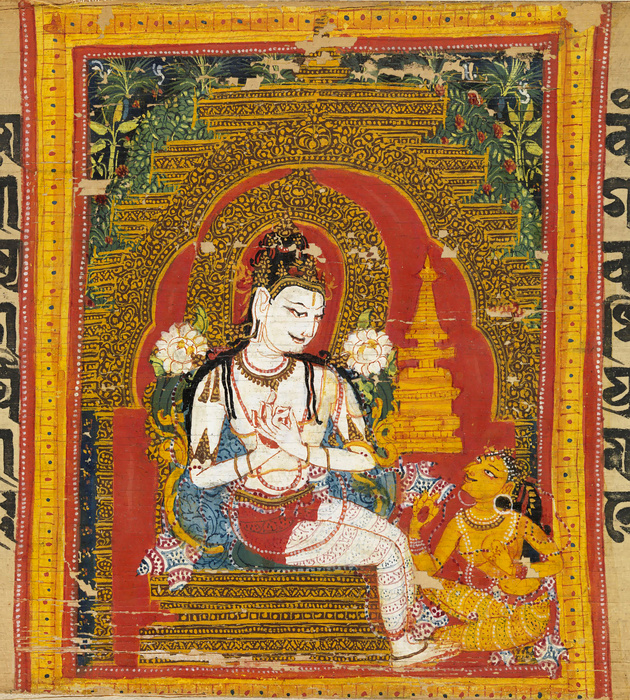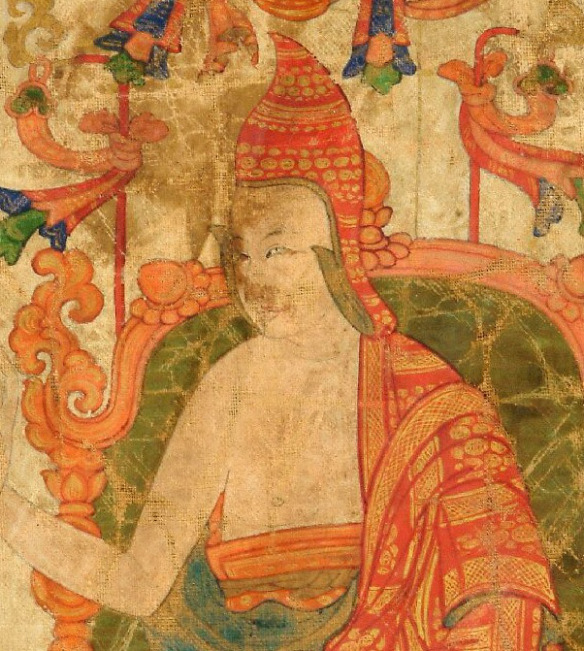|
Bodhicitta
In Mahayana Buddhism, bodhicitta, ("enlightenment-mind" or "the thought of awakening"), is the mind (citta) that is aimed at awakening ( bodhi), with wisdom and compassion for the benefit of all sentient beings. Bodhicitta is the defining quality of the Mahayana bodhisattva (a being striving towards Buddhahood) and the act of giving rise to bodhicitta (''bodhicittotpāda)'' is what makes a bodhisattva a bodhisattva. The '' Daśabhūmika Sūtra'' explains that the arising of bodhicitta is the first step in the bodhisattva's career. Etymology Etymologically, the word is a combination of the Sanskrit words bodhi and citta. ''Bodhi'' means "awakening" or "enlightenment". ''Citta'' derives from the Sanskrit root ''cit'', and means "that which is conscious" (i.e., mind or consciousness). ''Bodhicitta'' may be translated as "awakening mind" or "mind of enlightenment". It is also sometimes translated as "the thought of enlightenment." Definition Indian sources The term bodhicit ... [...More Info...] [...Related Items...] OR: [Wikipedia] [Google] [Baidu] |
Bodhisattva
In Buddhism, a bodhisattva ( ; sa, 𑀩𑁄𑀥𑀺𑀲𑀢𑁆𑀢𑁆𑀯 (Brahmī), translit=bodhisattva, label=Sanskrit) or bodhisatva is a person who is on the path towards bodhi ('awakening') or Buddhahood. In the Early Buddhist schools as well as modern Theravada Buddhism, a bodhisattva ( Pali: ''bodhisatta'') refers to someone who has made a resolution to become a Buddha and has also received a confirmation or prediction from a living Buddha that this will be so. In Mahayana Buddhism, a bodhisattva refers to anyone who has generated '' bodhicitta'', a spontaneous wish and compassionate mind to attain Buddhahood for the benefit of all sentient beings. Mahayana bodhisattvas are spiritually heroic persons that work to attain awakening and are driven by a great compassion (''mahakaruṇā''). These beings are exemplified by important spiritual qualities such as the "four divine abodes" ('' brahmaviharas'') of loving-kindness (''metta''), compassion ('' karuṇā''), e ... [...More Info...] [...Related Items...] OR: [Wikipedia] [Google] [Baidu] |
Mahayana
''Mahāyāna'' (; "Great Vehicle") is a term for a broad group of Buddhist traditions, texts, philosophies, and practices. Mahāyāna Buddhism developed in India (c. 1st century BCE onwards) and is considered one of the three main existing branches of Buddhism (the other being ''Theravāda'' and Vajrayana).Harvey (2013), p. 189. Mahāyāna accepts the main scriptures and teachings of early Buddhism but also recognizes various doctrines and texts that are not accepted by Theravada Buddhism as original. These include the Mahāyāna Sūtras and their emphasis on the ''bodhisattva'' path and ''Prajñāpāramitā''. '' Vajrayāna'' or Mantra traditions are a subset of Mahāyāna, which make use of numerous tantric methods considered to be faster and more powerful at achieving Buddhahood by Vajrayānists. "Mahāyāna" also refers to the path of the bodhisattva striving to become a fully awakened Buddha ('' samyaksaṃbuddha'') for the benefit of all sentient beings, and is thu ... [...More Info...] [...Related Items...] OR: [Wikipedia] [Google] [Baidu] |
Prajnaparamita
A Tibetan painting with a Prajñāpāramitā sūtra at the center of the mandala Prajñāpāramitā ( sa, प्रज्ञापारमिता) means "the Perfection of Wisdom" or "Transcendental Knowledge" in Mahāyāna and Theravāda Buddhism. Prajñāpāramitā refers to a perfected way of seeing the nature of reality, as well as to a particular body of Mahāyāna scriptures ( sūtras) which discusses this wisdom. It also refers to the female deity Prajñāpāramitā Devi, a personification of wisdom also known as the "Great Mother" (Tibetan: ''Yum Chenmo''). The word ''Prajñāpāramitā'' combines the Sanskrit words '' prajñā'' "wisdom" (or "knowledge") with '' pāramitā'' "perfection" or " transcendent". Prajñāpāramitā is a central concept in Mahāyāna Buddhism and is generally associated with ideas such as emptiness ('' śūnyatā''), 'lack of svabhāva' ( essence), the illusory (''māyā'') nature of things, how all phenomena are characterized by "non- ... [...More Info...] [...Related Items...] OR: [Wikipedia] [Google] [Baidu] |
Bodhisattvacaryāvatāra
The ''Bodhisattvacaryāvatāra'' or ''Bodhicaryāvatāra'' ( sa, बोधिसत्त्वाचर्यावतार; Tibetan: བྱང་ཆུབ་སེམས་དཔའི་སྤྱོད་པ་ལ་འཇུག་པ་ ''byang chub sems dpa'i spyod pa la 'jug pa;'' Chinese: 入菩薩行論; Japanese: 入菩薩行論) translated into English as ''A Guide to the Bodhisattva's Way of Life'', is a Mahāyāna Buddhist text written c. 700 AD in Sanskrit verse by Shantideva (Śāntideva), a Buddhist monk at Nālandā Monastic University in India which is also where it was composed. Structure It has ten chapters dedicated to the development of bodhicitta (the mind of enlightenment) through the practice of the six perfections (''Skt.'' Pāramitās). The text begins with a chapter describing the benefits of the wish to reach enlightenment. The sixth chapter, on the perfection of patient endurance (''Skt.'' ), strongly criticizes anger and has been the subjec ... [...More Info...] [...Related Items...] OR: [Wikipedia] [Google] [Baidu] |
Zoketsu Norman Fischer
Zoketsu Norman Fischer is an American poet, writer, and Soto Zen priest, teaching and practicing in the lineage of Shunryu Suzuki. He is a Dharma heir of Sojun Mel Weitsman, from whom he received Dharma transmission in 1988. Fischer served as co-abbot of the San Francisco Zen Center from 1995–2000, after which he founded the Everyday Zen Foundation in 2000, a network of Buddhist practice group and related projects in Canada, the United States and Mexico. Fischer has published more than twenty-five books of poetry and non-fiction, as well as numerous poems, essays and articles in Buddhist magazines and poetry journals. Early life and education Norman Fischer was born to a Jewish family in Wilkes-Barre, Pennsylvania in 1946, and was raised in Pittston, Pennsylvania. As a child he attended services with his parents at a Conservative synagogue. He received a B.A. from Colgate University, where he studied religion, philosophy, and literature, an M.F.A. in poetry from the Iowa Write ... [...More Info...] [...Related Items...] OR: [Wikipedia] [Google] [Baidu] |
Masaharu Anesaki
, also known under his pen name , was a leading Japanese intellectual and scholar of the Meiji period. Anesaki is credited as being the father of religious studies in Japan, but also wrote on a variety of subjects including culture, literature, and politics. He was also a member of the International Committee on Intellectual Cooperation of the League of Nations. After studies in Philosophy at the Tokyo Imperial University, he spent three years in Europe (1900–1903). During this time he studied under Deussen, Hermann Oldenberg, Gerbe, and Albrecht Weber in Germany, as well as Thomas William Rhys Davids in England. He spent more than another year abroad in 1908–09 with partial support from Albert Kahn, the French Philanthropist. During that time he traveled extensively through Italy, tracing the steps of Saint Francis of Assisi. His travelogue ''Hanatsumi Nikki'' (Flowers of Italy) recounts that journey. He spent 1913 to 1915 as a visiting scholar at Harvard University le ... [...More Info...] [...Related Items...] OR: [Wikipedia] [Google] [Baidu] |
14th Dalai Lama
The 14th Dalai Lama (spiritual name Jetsun Jamphel Ngawang Lobsang Yeshe Tenzin Gyatso, known as Tenzin Gyatso (Tibetan: བསྟན་འཛིན་རྒྱ་མཚོ་, Wylie: ''bsTan-'dzin rgya-mtsho''); né Lhamo Thondup), known as Gyalwa Rinpoche to the Tibetan people, is the current Dalai Lama. He is the highest spiritual leader and former head of the country of Tibet. He was born on 6 July 1935, or in the Tibetan calendar, in the Wood-Pig Year, 5th month, 5th day. He is considered a living Bodhisattva, specifically, an emanation of Avalokiteśvara in Sanskrit and Chenrezig in Tibetan. He is also the leader and a monk of the Gelug school, the newest school of Tibetan Buddhism, formally headed by the Ganden Tripa. The central government of Tibet, the Ganden Phodrang, invested the Dalai Lama with temporal duties until his exile in 1959. The 14th Dalai Lama was born to a farming family in Taktser (Hongya Village), in the traditional Tibetan region of Amdo (admini ... [...More Info...] [...Related Items...] OR: [Wikipedia] [Google] [Baidu] |
Routledge
Routledge () is a British multinational publisher. It was founded in 1836 by George Routledge, and specialises in providing academic books, journals and online resources in the fields of the humanities, behavioural science, education, law, and social science. The company publishes approximately 1,800 journals and 5,000 new books each year and their backlist encompasses over 70,000 titles. Routledge is claimed to be the largest global academic publisher within humanities and social sciences. In 1998, Routledge became a subdivision and imprint of its former rival, Taylor & Francis Group (T&F), as a result of a £90-million acquisition deal from Cinven, a venture capital group which had purchased it two years previously for £25 million. Following the merger of Informa and T&F in 2004, Routledge became a publishing unit and major imprint within the Informa "academic publishing" division. Routledge is headquartered in the main T&F office in Milton Park, Abingdon, Oxfordshir ... [...More Info...] [...Related Items...] OR: [Wikipedia] [Google] [Baidu] |
Paul Williams (Buddhist Studies Scholar)
Paul Williams (born 1950) is Emeritus Professor of Indian and Tibetan Philosophy at the University of Bristol, England. Until his retirement in 2011 he was also director for the University's Centre for Buddhist Studies, and is a former president of the UK Association for Buddhist Studies. Biography Williams studied at the University of Sussex's School of African & Asian Studies where he graduated with a first class BA in 1972. He then went on to study Buddhist Philosophy at Wadham College, University of Oxford, where he was awarded his DPhil in 1978. His main research interests are Madhyamaka Buddhist philosophy, Mahayana Buddhism, and Medieval philosophical and mystical thought. Williams was a Buddhist himself for many years but has since converted to Roman Catholicism, an experience he wrote about in his book ''The Unexpected Way''Paul J. Griffiths"On honeymoon" '' Commonweal'', 17 January 2003. and in an article, "On converting from Buddhism to Catholicism – One convert ... [...More Info...] [...Related Items...] OR: [Wikipedia] [Google] [Baidu] |
Shantideva
Shantideva (Sanskrit: Śāntideva; ; ; mn, Шантидэва гэгээн; vi, Tịch Thiên) was an 8th-century CE Indian philosopher, Buddhist monk, poet, and scholar at the mahavihara of Nalanda. He was an adherent of the Mādhyamaka philosophy of Nāgārjuna. He is also considered to be one of the 84 mahasiddhas and is known as Bhusuku. Biography The ''Zhansi Lun'' of the East Asian Mādhyamaka identifies two different individuals given the name "Shant inideva": their founder of the Avaivartika Sangha in the 6th century CE and a later Shantideva who studied at Nalanda in the 8th century CE and appears to be the source of the Tibetan biographies. Archaeological discoveries support this thesis. Two Tibetan sources of the life of Shantideva are the historians Buton Rinchen Drub and Tāranātha. Recent scholarship has brought to light a short Sanskrit life of Shantideva in a 14th-century CE Nepalese manuscript. An accessible account that follows the Butön closely can b ... [...More Info...] [...Related Items...] OR: [Wikipedia] [Google] [Baidu] |






